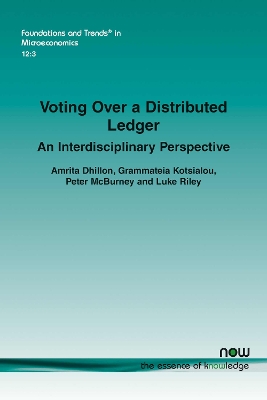Foundations and Trends (R) in Microeconomics
1 total work
Voting Over a Distributed Ledger
by Amrita Dhillon, Grammateia Kotsialou, Peter McBurney, and Luke Riley
Published 6 September 2021
Voting Over a Distributed Ledger: An Interdisciplinary Perspective presents the case that electronic voting can improve accessibility, leading to some positive outcomes. It can also lead to faster counting and can be cost efficient. The authors document the various problems with centralized electronic voting systems and show how the blockchain can potentially overcome these problems. The authors introduce the concept of distributed ledger technology (DLT) (blockchains are a special case of DLT) and how they can improve both the accessibility and trust properties of an online voting system. This monograph is organized as follows. Section 2 focuses on centralized on-line voting systems (i.e., that do not use distributed ledger technology), describing their general architecture and outlining their vulnerable areas for manipulation. Section 3 describes from scratch the distributed ledger technology and how its promising features can be used for online voting. Section 4 focuses on a special case of distributed ledgers, called blockchains, and analyses the multiple ways (consensus protocols) on reaching agreement on voting data. Section 5 discusses a possible conceptualization on using a blockchain based infrastructure for voting systems. Section 6 presents existing blockchain based voting systems by categorizing them according to the extent that they use this technology, concluding with details of a recent academic implementation. Finally, Section 7 concludes with open questions for economists and other social scientists working in this area.
